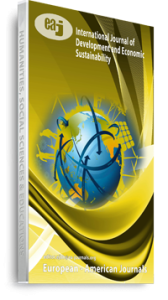The study examines the causal relationship between economic growth and indirect taxes in Nigeria. Ex-post facto research design was employed and time series data were sourced from Central Bank Nigeria (CBN) statistical bulletin of various years 1994-2014. Multiple regression inferential statistics was used for data analysis. The result reveals that VAT has a positive significance effect on GDP. This is because the computed t-statistic of 3.142 is greater than the critical value table value of 2.120. The result of the second hypothesis also showed that the computed t- statistic of 4.557 is greater than the critical table value of 2.120 thus, proving that CED actually has a positive significance effect on GDP. The study conclude and that VAT and CED as indirect taxes contributes to economic growth in Nigeria, hence government should intensify effort to ensure immediate response of payment by the general public as flow of fund will encourage faster economic growth.
Keywords: Custom and Excise duties, Gross Domestic Product, Value Added Tax, economic growth

